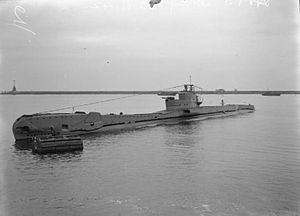HMS Torbay (N79)

HMS Torbay
|
|
| History | |
|---|---|
|
|
|
| Name: | HMS Torbay |
| Builder: | Chatham Dockyard |
| Laid down: | 21 November 1938 |
| Launched: | 9 April 1940 |
| Commissioned: | 14 January 1941 |
| Fate: |
|
| Badge: | |
| General characteristics | |
| Class and type: | T-class submarine |
| Displacement: |
|
| Length: | 275 ft (84 m) |
| Beam: | 26 ft 6 in (8.08 m) |
| Draught: | 16.3 ft (5.0 m) |
| Propulsion: |
|
| Speed: |
|
| Range: | 4,500 nmi (8,300 km) at 11 kn (20 km/h) surfaced |
| Test depth: | 300 ft (91 m) max |
| Complement: | 59 |
| Armament: |
|
HMS Torbay (N79) was a T-class submarine of the Royal Navy. She was laid down at Chatham Dockyard and launched on 9 April 1940.
Torbay had an active career, serving mainly in the Mediterranean, although she also served in the Pacific Far East at the end of the war.
Altogether she sank 17 merchant ships, totalling 38,000 tons, plus 5 warships and 24 sailing vessels, and was involved in an attack on Corfu harbour that won her captain, Lieutenant Commander (Lt. Cdr.) Anthony Miers, the Victoria Cross.
Torbay was also involved in two incidents alleged to be war crimes.
Torbay was commissioned on 14 January 1941, under the command of Lt. Cdr. Anthony Miers.
In March 1941 she sailed from Portsmouth on her first offensive patrol, to intercept the battleships Scharnhorst and Gneisenau, which were heading for Brest after their raiding sortie in the North Atlantic. Unable to find them, Torbay was ordered to continue to Gibraltar, and, after another patrol in the Mediterranean, to join the 1st Flotilla at Alexandria.
From there, Torbay operated for the next 12 months, sinking a number of ships and taking part in several special operations.
In July 1941, on her first patrol from Alexandria, Torbay was involved in two incidents which gave rise to allegations of war crimes. It is alleged that on two occasions after sinking enemy ships, Miers had Torbay's crew fire on troops as they swam in the water. Miers made no attempt to hide his actions and reported it in his official logs. He received a strongly worded reprimand from the Royal Navy after the first incident.
...
Wikipedia

